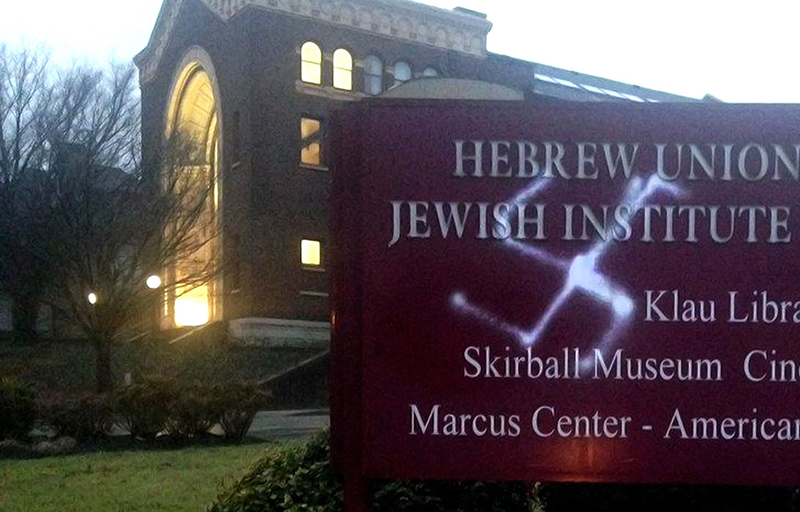(RNS) — Last spring, anti-Semitic flyers were posted on a number of college campuses, including the University of Illinois at Chicago and Texas State University. A swastika was painted on the school sign at Hebrew Union College in Cincinnati.
It was no different at Allegheny College, a small liberal arts college in northwestern Pennsylvania, where I recently graduated.
Near the end of the fall semester, Hanukkah decorations were ripped from outside a Jewish student’s dorm room, and in the spring swastikas were found scratched on dorm room doors and in the library.
Such anti-Semitic attacks have always seemed fairly removed from my college experience. They were someone else’s problem. But when they took place in my community within such a short span of time, it was devastating. Why here? Why us?
This year on Yom Hashoah, Holocaust Remembrance Day, a study released by Tel Aviv University called U.S. college campuses “a hotbed of anti-Semitism.”
Reports suggest an increase in anti-Semitic incidents since President Trump’s election. But this is a form of abuse that Jews have always faced, from the Holocaust to country clubs excluding Jews here in the United States.
After the incidents at my campus, Jewish students, professors and town residents were invited to university President James Mullen’s house for dinner and a discussion. I was anxious to go. The president as well as the dean and other administrators spoke about the sense of community they try to build and how these acts do not represent who we, as a college community, truly are. Jewish students shared their experiences on campus. We praised the administration’s quick handling of the incidents and invitation to dinner, but also felt that greater work was needed to curb such actions.
The president agreed with our sentiments that this wasn’t unique to Allegheny. He did make clear that he wanted our college to be a place where we wouldn’t face such hateful rhetoric and could openly practice our religion.
Leaving the dinner that night, I felt empowered — not because the school would necessarily catch the assailants but because I believed the discussion would lead to campuswide conversations, training, and guest speakers representing all minorities.
With the fall semester approaching, colleges and universities should already be preparing a plan of prevention. They should know that the increase of anti-Semitic incidents is not a fluke as a result of the election of Donald Trump, but are part of the long history of discrimination against Jews.
(Ezra Pasackow is a 2017 graduate of Allegheny College in Meadville, Pa., where he was president of Hillel, the Jewish campus group. The views expressed in this opinion piece do not necessarily reflect those of Religion News Service)
This commentary is part of a series of essays on young Americans’ experiences of religion and spirituality. Unsolicited submissions are welcome: info@religionnews.com



